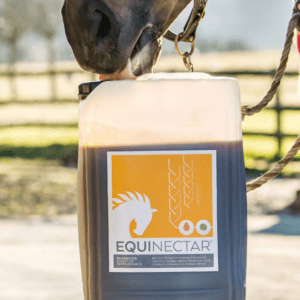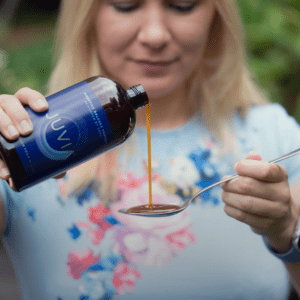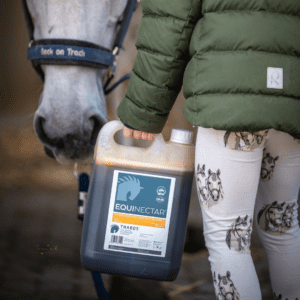

Author: Ben Nedas
Chief Commercial Officer
Contributing Editor: Mark Bowen
Specialist Internal Medicine Vet
Ulcers or Hindgut Disease? Unravelling the Similarities and Differences
As horse owners, we're all too familiar with the threat of gastric ulcers. These painful lesions, affecting the lining of the horse's stomach, have been a topic of concern within the equestrian community for years. However, there's another condition that often flies under the radar but is equally significant - hindgut disease.
The Intersection of Symptoms
One of the reasons why these conditions can be so elusive is the significant overlap in their signs. As you'll see in the accompanying graphic, the signs of gastric ulcers and hindgut diseases can be strikingly similar.
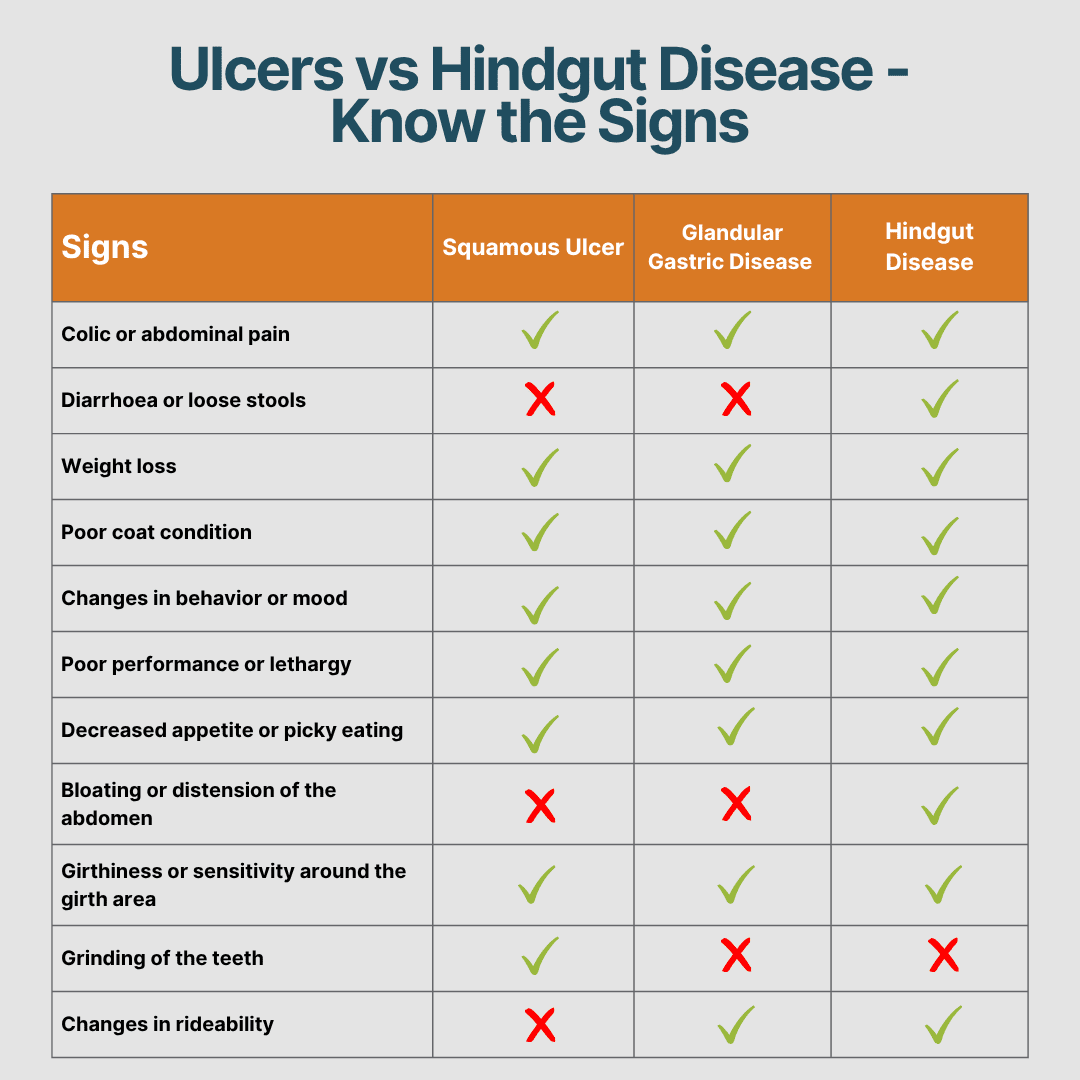
Gastric Ulcers: A Known Adversary
Gastric ulcers, encompassing both squamous ulcers and glandular gastric disease, are part of the broader condition known as Equine Gastric Ulcer Syndrome (EGUS). These ulcers can cause a range of symptoms, including poor appetite, weight loss, a dull coat, and behavioural changes such as increased irritability. However, these symptoms are not exclusive to EGUS and can be indicative of other health issues, underscoring the importance of a thorough veterinary examination.
Hindgut Disease: The Silent Culprit
Hindgut disease, on the other hand, refers to conditions affecting the horse's hindgut. This includes ailments such as:
- Colonic Ulcers: These are sores or lesions in the lining of the horse's large intestine. They can cause symptoms such as weight loss, poor appetite, and changes in behaviour.
- Right Dorsal Colitis: This is an inflammation of the right dorsal colon, often associated with the use of non-steroidal anti-inflammatory drugs (NSAIDs). Symptoms can include weight loss, diarrhoea, and colic.
- Colitis: This is a general term for inflammation of the colon, which can be caused by various factors including infection, dietary changes, or certain medications. Symptoms can include diarrhoea, dehydration, and abdominal pain.
- Impaction: This is a blockage in the horse's large intestine, often caused by dehydration or a lack of fibre in the diet. Symptoms can include colic, loss of appetite, and a decrease in the amount of manure produced.
- Irritable Bowel Syndrome (IBS): While not as commonly diagnosed in horses as in humans, IBS is a disorder that can affect a horse's large intestine. It is characterized by chronic inflammation and discomfort of the horse's bowel, often associated with varying degrees of diarrhoea, constipation, gas, and abdominal pain. The exact cause of IBS in horses is not well understood, but it may be related to diet, stress, or a disruption in the balance of gut bacteria.
- Hindgut Acidosis: This condition occurs when the pH balance in a horse's hindgut becomes disrupted, often due to a diet high in starches and sugars that are rapidly fermented by the gut bacteria. This rapid fermentation results in the production of lactic acid, which can lower the pH of the hindgut and potentially damage the lining of the intestine.
- Dysbiosis: This is a term used to describe an imbalance in the gut microbiota. The horse's hindgut is home to a complex community of bacteria that play a crucial role in digestion and overall health. When this balance is disrupted, it can lead to a range of health issues.
While these conditions may not be as well-known as gastric ulcers, they are no less significant. Symptoms can mirror those of gastric ulcers, with additional signs like loose stools or diarrhoea, making them sometimes more challenging to diagnose.
The Imperative of Awareness
The key message here is that while gastric ulcers are a well-recognised threat, we must not overlook the potential for hindgut diseases. The symptoms of these conditions can be incredibly similar, and it's crucial for us, as responsible horse owners and caretakers, to be aware of this.
Remember, if your horse is showing any signs of discomfort or changes in behaviour, it's always best to consult with your vet. They can perform the necessary tests to determine the root cause of the issue and guide you on the best course of treatment.
The Science Behind Gut Health: Understanding pH Balance
One of the most significant indicators of hindgut health is faecal pH. Research has shown that grazing horses typically have a faecal pH in the range of 6.4 to 6.7, whilst a pH between 6.0 and 6.4 is characteristic of subclinical acidosis. pH values below 6.0 are associated with osmotic diarrhoea and indicate severe acidosis in the hindgut.
The problem is particularly acute in performance horses on high-carbohydrate diets. These diets frequently exacerbate gut health issues, leading to a proliferation of lactic acid-producing bacteria with a decrease in the short chain fatty acids (SCFAs), which are a major component of equine nutrition. The increases in lactic and acetic acids cause a pH drop in the horse's hindgut, potentially leading to acidosis, weight loss, inappetence, diminishing condition, demeanour changes, and loss of performance consistency.
Interestingly, acidification of the equine gut isn't only a concern for performance horses. Leisure horses are also at risk, particularly when turned out to graze on new rich pastures. The ingestion of fructans from fresh grass can trigger similar problems, as these complex sugars are resistant to digestion in the small intestine and are fermented in the large intestine, with a subsequent change in the balance of the microbiome and the production of acidic conditions. This process may trigger colitis in susceptible horses.
Supporting Your Horse's Digestive Health with EquiNectar
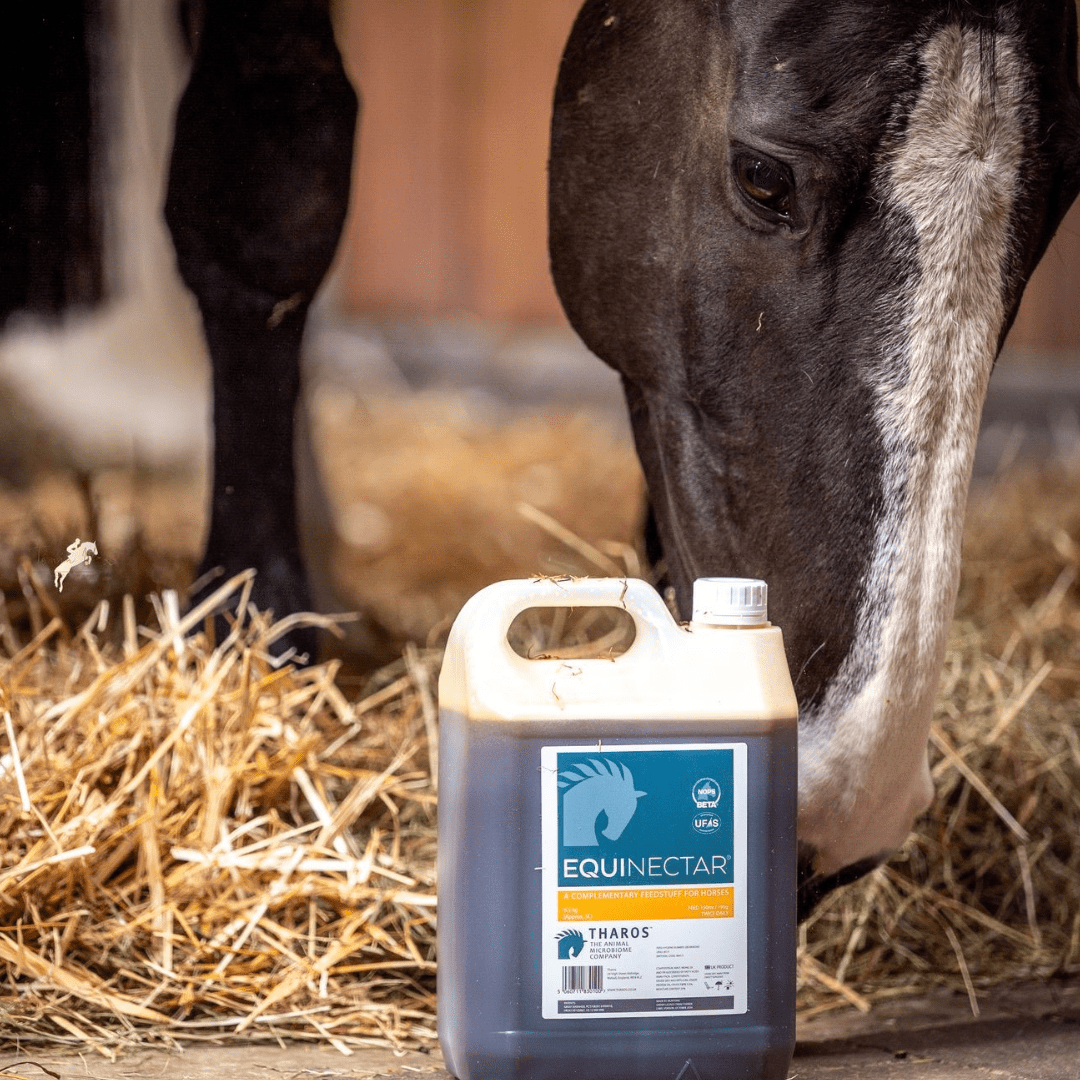
Whether your horse is dealing with gastric ulcers, hindgut disease, or you're simply looking to maintain optimal digestive health, supporting the gut microbiome is essential. This is where EquiNectar can play a valuable role in your horse's daily care routine.
EquiNectar is a natural digestive syrup made from malted barley that preserves all the natural goodness of the barley grain. What makes it particularly beneficial for horses experiencing digestive discomfort is its unique combination of active digestive enzymes. These enzymes work to support your horse's natural digestive processes, helping to break down feed more efficiently before it reaches the hindgut.
The Active Enzymes in EquiNectar
The enzyme-rich malt extract in EquiNectar includes naturally occurring enzymes that work synergistically to support digestion:
Amylase (both alpha and beta forms) helps break down starch. This is particularly important since horses naturally produce very little amylase, as they did not evolve to eat diets high in grain starch. Supplemental amylase helps your horse break down cereal starch more effectively.
Fructanase breaks down fructans, which are complex sugars found in plants and fresh grass. This enzyme is especially valuable in helping your horse process these challenging compounds that can otherwise lead to hindgut fermentation issues.
Phytase breaks down phytic acid found in plants. Phytic acid binds to minerals such as phosphorus and calcium, making them unavailable for absorption. Phytase improves the availability of these essential nutrients from plant-based feeds.
Cellulase, Xylanase, and Beta-glucanase work together to break down the complex sugars found in plant cell walls, including cellulose, xylans, and beta-glucans. This aids in the digestion of forage and hay, which are major components of your horse's diet.
Scientific Evidence: The pH Study
The effectiveness of EquiNectar in supporting hindgut health isn't just theoretical—it's backed by rigorous scientific research. A comprehensive study conducted with 72 Thoroughbred racehorses from nine training yards across the UK demonstrated remarkable results.
In this study, horses received 150ml of EquiNectar twice daily in their regular feed whilst maintaining their typical feeding patterns and training routines. The results were striking: faecal pH rose from an average of 6.20 to 6.40 over just four weeks of supplementation. This increase was not only statistically significant (p<0.0001), but also clinically relevant.
Perhaps most importantly, the proportion of horses with a "normal" faecal pH increased dramatically—from just 11% at the study's outset to 55% at its conclusion. This means that although their standard concentrated diet was unchanged, many horses developed a faecal pH comparable with that of grazing animals over a relatively short period of supplementation.
How EquiNectar Works to Support Gut Health
By aiding in the breakdown of feed in the foregut, EquiNectar helps reduce the starch load reaching the large intestine. This is particularly significant when considering conditions like hindgut acidosis, where rapid fermentation of starches and sugars can create an unhealthy pH balance and proliferation of lactic acid-producing bacteria.
The active enzymes work on the feed to support more complete digestion earlier in the digestive process, which helps optimise hindgut bacteria. This can contribute to reduced gas production, bloating, and discomfort—symptoms that are common to both gastric ulcers and various hindgut diseases.
EquiNectar promotes the growth of beneficial bacteria in the gut whilst helping to restore balance to the microbiome. This microbial balance is vital for equines and directly influences their overall health and performance. The supplement also contains all B vitamins, notably high in folate and niacin, which support overall health and wellbeing.
Real Benefits for Horses with Digestive Issues
Horse owners have reported numerous improvements when using EquiNectar, including:
- Improved dropping consistency, moving from loose or acidic droppings towards more normal, well-formed manure
- Reduction in agitation and irritability caused by hindgut discomfort
- Enhanced performance and consistency in work
- Better appetite, with even fussy horses finishing their feed (EquiNectar is delicious and highly palatable)
- Improved body condition and muscle tone
- More positive demeanour and behaviour
These benefits align closely with addressing many of the symptoms associated with both gastric ulcers and hindgut diseases, from behavioural changes and poor appetite to inconsistent performance and deteriorating condition.
A Complementary Approach to Digestive Care
It's important to note that whilst EquiNectar supports digestive health by promoting beneficial bacteria growth and providing active enzymes for improved digestion, it should be seen as part of a comprehensive approach to your horse's care. Always work with your veterinarian to properly diagnose and treat any digestive conditions, whether they involve the stomach or hindgut.
EquiNectar works best when combined with appropriate veterinary care, proper nutrition, suitable management practices, and attention to your horse's individual needs. By supporting the gut microbiome and aiding digestion, EquiNectar can help create the optimal conditions for your horse's digestive system to function at its best, whether you're managing an existing condition or working to prevent future issues.
The ability to influence gut health through a simple dietary addition represents a significant stride forward in equine care, particularly given the common issues associated with high-carbohydrate diets in performance horses and the challenges faced by leisure horses grazing on rich pastures.
The Final Word
Understanding the health of our horses is a continuous learning journey. By expanding our knowledge and staying informed about conditions like gastric ulcers and hindgut diseases, we can ensure we're providing the best possible care for our equine companions.
Remember, the health and happiness of our horses are in our hands. Let's continue to learn, grow, and provide the best for our beloved equine friends.
Stay tuned for more insightful discussions on equine health and wellness. Until then, happy riding!
Contributors

Mark Bowen
BVetMed MMedSci(MedEd) PhD CertVA CertEM(IntMed) DipACVIM-LAIM DipECEIM PFHEA FRCVS
Mark is an internationally recognised veterinary specialist and clinical scientist. His career has seen him obtain recognition in a large range of disciplines.
He is an RCVS recognised specialist in equine internal medicine, a EBVS European specialist in Veterinary Sports Medicine and Rehabilitation and an ABVS American Specialist in Large Animal Internal Medicine.
Mark spent a career in clinical academia being promoted all the way to Professor, before building his own clinical and educational consultancy business in 2021, working for a range of businesses including The European Board of Veterinary Specialisation (EBVS) and Veterinary Continuous Education in Europe (VetCEE). He is author of many publications, including the development of consensus guidelines for the management of gastric disease, obesity and pain in horses.
ABOUT EQUINECTAR
Description
EquiNectar® is a natural feed supplement, that is scientifically proven to:
- Re-balance your horse’s gut bacteria
- Help your horse maximise benefits from its feed
- Improve your horse’s condition
More information
EquiNectar® is produced by Tharos Ltd in the UK. It is a natural source of digestive enzymes and contains only the following ingredients:
- Our patented enzyme rich malt extract
- Medium chain triglycerides (from coconut oil)
- Potassium sorbate
For more details of the enzymes within EquiNectar® take a look at the ingredients and enzymes page.
How to feed
Simply add EquiNectar® to your horse's daily feed, using the Feeding Rate chart to determine the correct amount.
For detailed instructions about how to introduce EquiNectar, please read the comprehensive Feeding Guide page.


